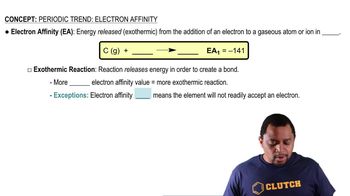Here are the essential concepts you must grasp in order to answer the question correctly.
Electron Affinity
Electron affinity is the energy change that occurs when an electron is added to a neutral atom in the gas phase, forming a negatively charged ion. It reflects the tendency of an atom to attract and hold onto an additional electron. For cations like Na+, the electron affinity indicates how easily the cation can gain an electron to revert to its neutral state.
Recommended video:
Ionization Energy
Ionization energy is the amount of energy required to remove an electron from a neutral atom in the gas phase, resulting in a positively charged ion. This energy reflects the strength of the attraction between the nucleus and the electrons. Higher ionization energy means that the atom holds its electrons more tightly, making it less likely to lose them.
Recommended video:
Relationship Between Electron Affinity and Ionization Energy
The relationship between electron affinity and ionization energy is often inversely correlated. Generally, elements with high ionization energies also exhibit high electron affinities, as both properties are influenced by the effective nuclear charge and the stability of the resulting ions. For example, a cation like Na+ has a high ionization energy, which suggests that it is energetically favorable for it to gain an electron, thus having a significant electron affinity.
Recommended video:
 McMurry 8th Edition
McMurry 8th Edition Ch.6 - Ionic Compounds: Periodic Trends and Bonding Theory
Ch.6 - Ionic Compounds: Periodic Trends and Bonding Theory Problem 66
Problem 66


